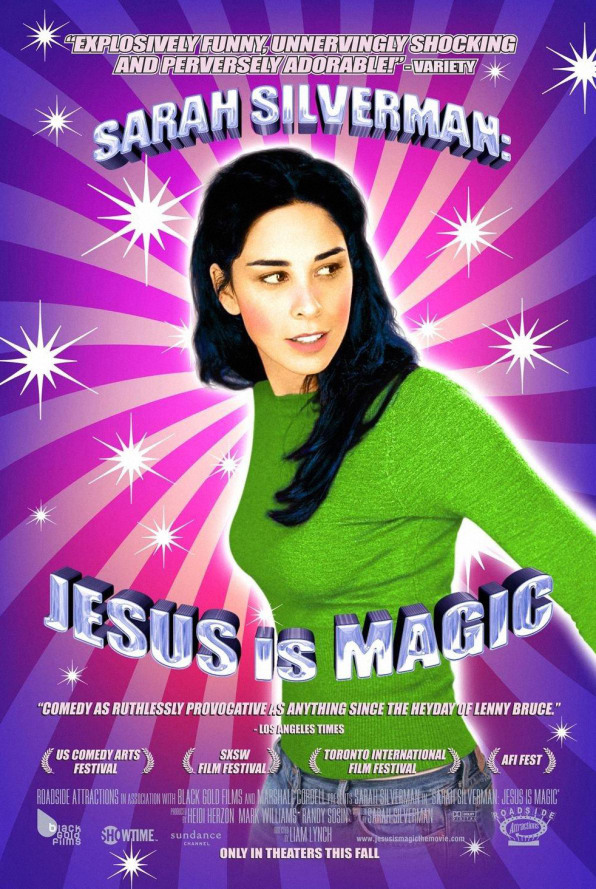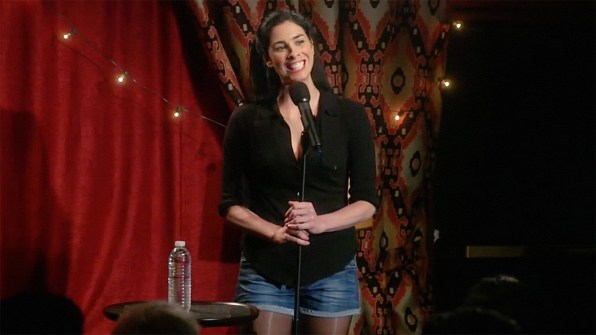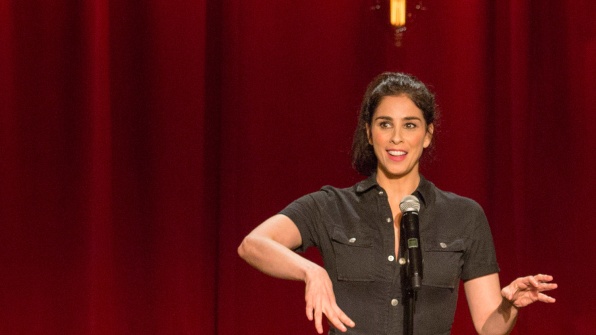Sarah Silverman: If You Don’t Look At Your Old Sh*t and Cringe, You’re Not Growing
The audience is dead silent.
Of course they are; Sarah Silverman, whose vibe is like a deceptive full-body thumbs-up, is in the middle of a horrifying story. This comedy special has taken a grim turn indeed. Sarah’s sister, the subject of the story, is unaware of the grave danger she’s in. Just when the tension reaches maximum discomfort, though, she expertly defuses it with a combustible kicker. As the laughs die down, the comic reveals that the fun of telling this joke is watching the audience go through it with her.
“I’m your show,” she tells the crowd, “but you’re also my show.”
That line, from Silverman’s new special, A Speck of Dust, was also used during her Emmy-winning 2013 show, We Are Miracles. It forces the live audience to become suddenly conscious of standup as a two-sided discussion. We’ve been watching Silverman grow as a comedian and a cultural force over the past couple decades, and she’s been watching us as well—absorbing the various reactions she’s provoked and using them to cultivate a deeper self-awareness. Perhaps only by being so observant and adaptive could she have delivered her latest special, the most comprehensive and funniest statement of her career so far.
Produced from the deep pockets of Netflix—which has been leading what’s essentially an arms race against HBO for dominance in the field of high-profile comedy specials—A Speck Of Dust feels more like a special than a collection of jokes. It’s cohesive. It’s thematic. It’s got running jokes and callbacks, and an unforgettable Easter Egg in the closing credits. (Seriously, stick around for the credits.)
It takes the comic’s self-awareness to a new level, deconstructing her own jokes for the audience as she’s telling them, peeling away the artifice behind it all.
“I like letting myself be changed by new information,” Silverman tells me. “I think we live in a country where people cling to what they know to be true—whether they’re presented with facts to the contrary or not. In comedy, that can be a real career-killer. People find success in one thing and then feel beholden to do just that one thing, and that’s how you become an irrelevant caricature. You have to be able to lose people and fail.”
Silverman’s own failure cycle—if you skip over her brief Saturday Night Live stint, years on Mr. Show, and early thankless girlfriend roles in movies—started a year after the film Passion of the Christ led faithful moviegoers to box office glory. That’s when Silverman released her first special, Jesus Is Magic, into theaters. It was standup as cinema vérité, interlaced with sketches and songs, all directed by frequent collaborator Liam Lynch. It was here, in her somewhat religious-themed coming out party, that Silverman established her style: thought-provoking concepts wrapped in aggressively stupid packaging.

“I was raped by a doctor…” she says in one notorious joke from that special. “Which is so bittersweet for a Jewish girl.”
It was a sledgehammer swung with an angelic smile. That joke is what came to define her as a comic, for better or worse—the comedy world is still debating whether rape jokes should be off limits. She has mixed feelings about it now.
“I think that joke has almost become a classic—not to be obnoxious—but it’s also become a relic,” Silverman says. “It’s so from another time, and it’s interesting to have done comedy through such totally different times. There’s so much in my first special that makes me cringe, but I’m not ashamed of it. You have to be accountable. And if you don’t look back at your old shit and cringe, you’re not growing.”
Jesus Is Magic also includes a run of racially charged bits, which are delivered in character as the musings of a well-meaning but misguided Pollyanna. Looking back, though, Silverman sees them more as the product of privilege. She grew up in a middle-class family of New Hampshire Democrats. Her best friend was black (no, really). She naively felt that her good intentions gave her license to say whatever she wanted on stage in service of a greater point.
“I mean, talk about a liberal bubble,” Silverman says.
The aura of throwing heavy words too lightly followed her for years. She was rebuked for using ‘chink’ in a joke on a Conan appearance in the early 2000s, for which she apologized, and she was the subject of several think pieces. Gradually, she shed this aspect of her act.

But even in Jesus is Magic, she delivers the most risqué jokes with a hint of self-awareness. “You live and learn and hopefully you grow,” she faux-reflects, after a racially charged joke. After that special, however, she really did live and learn, and she definitely grew.
A whole lot happened after Jesus Is Magic. Silverman created a popular Comedy Central series, wrote a bestselling memoir, and starred in movies like the Disney smash Wreck-It Ralph, and the indie dramedy Take This Waltz. She’d also become politically active, making videos to support voters’ rights, throwing a benefit for the NAACP, and working with the group Lady Parts Justice, to help ensure women’s access to birth control and abortion. She listened to her critics and investigated her beliefs, and this introspection is reflected nearly a decade later in We Are Miracles.
For instance, this second special, like its predecessor, also contains a rape joke, only this time it’s a rape joke about rape jokes. The self-conscious detachment meant to excuse her earlier material now informs the punchline itself. It’s still shocking, but she’s figured out how to hone the sledgehammer into something more precise.

By the time she recorded her Netflix special earlier this year, she’d burnished it into a surgical weapon.
“[A Speck of Dust] is a reflection of where I’m at, and where the world is right now,” Silverman says, pausing. I can feel a joke coming. Then she adds, “It’s also just about God and family and cum and shitting.”
She’s come a long way from Jesus is Magic. And so have we.
The standup comedian on her new Netflix Special
The audience is dead silent.
Fast Company , Read Full Story
(110)














